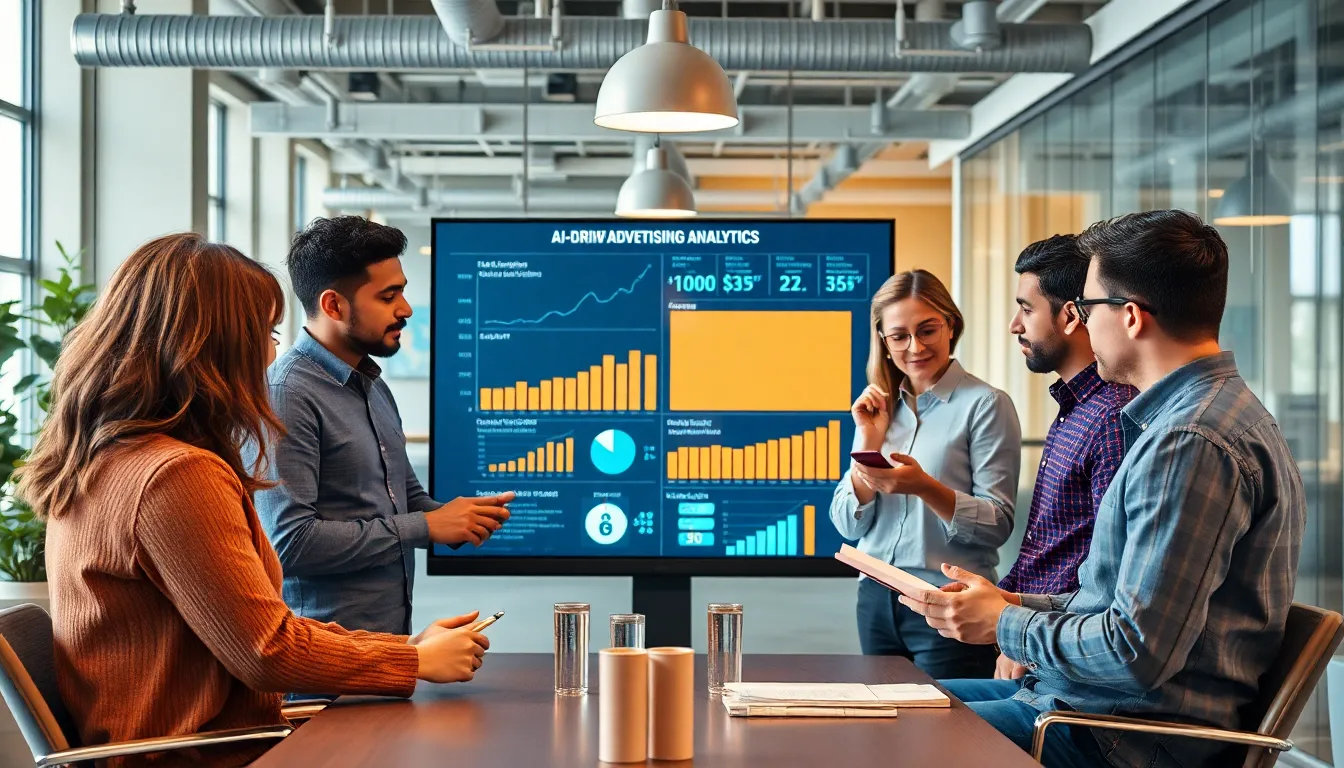Table of Contents
ToggleIn a world where attention spans are shorter than a cat video, AI-driven advertising is like the superhero we didn’t know we needed. It swoops in to save brands from the clutches of bland marketing, using data and algorithms to create campaigns that actually resonate. Imagine ads that know your preferences better than your best friend—it’s not magic; it’s artificial intelligence at work.
Overview of AI-Driven Advertising
AI-driven advertising revolutionizes how brands connect with consumers. This approach leverages machine learning and big data analytics to enhance campaign effectiveness. Marketers utilize algorithms that predict consumer behavior, enabling targeted messaging that resonates.
Advertisers analyze vast amounts of consumer data. Insights derived from this data guide the creation of personalized advertisements. For instance, AI can segment audiences based on preferences and past interactions, ensuring messages reach the right people.
Efficiency stands out with AI applications in advertising. Automated systems optimize ad placements in real-time, adjusting bids and targeting strategies based on performance metrics. Such processes reduce wasted spending while maximizing engagement rates.
AI tools can generate creative content. By employing natural language processing, brands create tailored messages that speak directly to individual desires and interests. This capability transforms ads from generic to personally relevant, driving conversions.
Furthermore, predictive analytics enhances campaign performance. AI forecasts trends and consumer habits, allowing brands to adapt strategies proactively. This foresight keeps companies ahead of market shifts.
Integrated AI solutions promote continuous improvement. They collect feedback from campaigns and recommend adjustments. Real-time data analysis provides a feedback loop that refines advertising strategies efficiently.
Overall, AI-driven advertising offers a strategic advantage in today’s digital landscape. This methodology not only boosts engagement but also strengthens the relationship between brands and consumers.
Benefits of AI-Driven Advertising


AI-driven advertising offers significant advantages for brands. Enhanced targeting and personalization lead to more effective campaigns, while improved ROI and efficiency streamline marketing efforts.
Enhanced Targeting and Personalization
AI technology utilizes vast data sets to analyze consumer behaviors. Predictive algorithms categorize audiences based on interests and interactions. Advertisers create tailored messages that resonate with specific groups. For instance, a brand might target millennials with eco-friendly products, using their previous purchase behavior. Segmentation allows for dynamic content that adjusts to viewer preferences, increasing engagement and driving conversions. Personalized marketing not only captures attention but fosters brand loyalty through relevant interactions.
Improved ROI and Efficiency
Automated systems optimize ad placements in real-time, significantly improving efficiency. Brands reduce wasted ad spend by targeting only relevant consumers. Analytics provide insights into campaign performance, enabling quick adaptations to strategies. This swift adjustment process enhances ROI, as marketers can allocate budgets more effectively. AI-driven tools streamline creative content generation, decreasing production time while maintaining quality. As a result, brands can focus efforts on high-performing ads, maximizing impact and profitability.
Challenges in AI-Driven Advertising
AI-driven advertising faces several notable challenges that brands must navigate. Among these, data privacy concerns rank high as regulations around consumer data tighten.
Data Privacy Concerns
Data privacy issues significantly impact how advertisers utilize consumer data. Marketers must comply with regulations like GDPR and CCPA, demanding transparency and consent. Collecting data with consumers’ knowledge promotes trust, yet many consumers remain unaware of how their data is used. Brand reputation suffers if privacy breaches occur, leading to financial consequences. Solutions include implementing robust data security measures as well as respecting user preferences regarding data sharing. Adopting transparency practices can enhance brand loyalty by ensuring consumers feel secure.
Algorithmic Bias
Algorithmic bias presents another challenge in AI-driven advertising. Machine learning models often reflect the biases present in training data, which can lead to unintended discrimination against specific demographic groups. Campaign performance can suffer when targeting capabilities are skewed or exclude certain audiences. A focus on diverse data sets during model training helps minimize bias. Regular audits of algorithms identify issues that may arise and ensure fairness in advertising efforts. Creating a more equitable advertising environment fosters inclusivity, benefiting both brands and consumers.
Future Trends in AI-Driven Advertising
AI-driven advertising continues to evolve, shaping the future of marketing strategies. Increased efficiency and innovative approaches lie at the forefront of these trends.
Increased Automation
Automation plays a crucial role in AI-driven advertising, streamlining processes and enhancing efficiency. Advertisers leverage automated systems to manage ad placements, enabling real-time adjustments that maximize impact. These systems analyze data continuously, allowing brands to reduce wasted ad spend significantly. Predictive algorithms target the right audiences with precision, ensuring ads reach consumers most likely to engage. Measurement of campaign performance becomes effortless, as automation provides insights into various metrics. This shift allows marketers to focus on strategy and creativity instead of manual tasks. As automation becomes standard, brands experience quicker turnaround times and improved campaign agility.
The Role of Machine Learning
Machine learning stands as a backbone in AI-driven advertising, facilitating data analysis and decision-making. Algorithms learn from extensive consumer data sets, uncovering patterns that inform targeting strategies. Advertisers predict consumer behavior accurately, allowing for hyper-personalized messaging. Campaigns evolve based on real-time analytics, adapting to changing consumer preferences. Brands benefit from insights that deepen engagement with specific demographic groups. With machine learning, creativity in ad content can flourish since AI systems generate relevant ideas based on audience interactions. Companies that embrace machine learning enhance their advertising effectiveness while fulfilling consumer expectations for personalized experiences.




